How does the Cairo "empire of scavengers" live, dictating its will to the Egyptian authorities
About 25 million people live in Cairo and its suburbs. The Egyptian capital can compete with small European states in terms of scale. The giant city produces an incredible amount of waste that could fill it up in a few months to the upper floors, but this does not happen, since an entire "empire" in the state is on guard of cleanliness. The Manshiyat Nasir scavenger quarter is the most unpleasant, but no less important than the business center, the area of the metropolis.
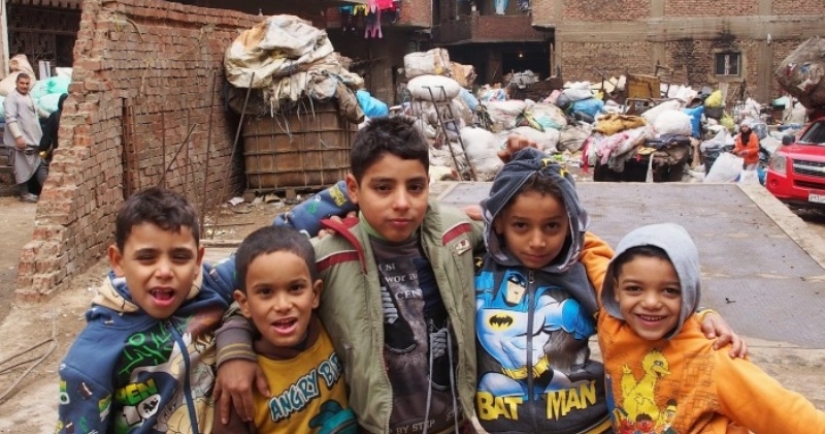
In 1969, the mayor of Cairo ordered to compactly settle all the garbage collectors of the capital in one block. Such a place was Manshiyat Nasir, which became a home and a place of work for thousands of Cairo residents who connected their lives with garbage and its disposal. This part of the city has developed and grown from year to year and now 260 thousand residents live compactly in the quarter. Almost all the inhabitants of the scavengers ' quarter are Copts, that is, Egyptian Orthodox Christians.
Everyone who comes to this part of Cairo for the first time is literally knocked down by an incredible stench that cannot be described in words. This is a terrible combination of the smell of rotting fruits, spoiled food and decomposed corpses of cats and dogs. Locals laugh at the gentle guests and assure that after a couple of hours a person "sniffs" and the stench no longer bothers him.
A significant part of the residents of the Manshiyat Nasir quarter have the same profession-a sorter, or in Arabic-"zabbalin". This word translates as "the people of garbage" and it is impossible to say more precisely. The whole life of sorters, from birth to death, passes among the waste of a huge city, which they sort through, laying out in separate groups and looking for valuable things among the trash.
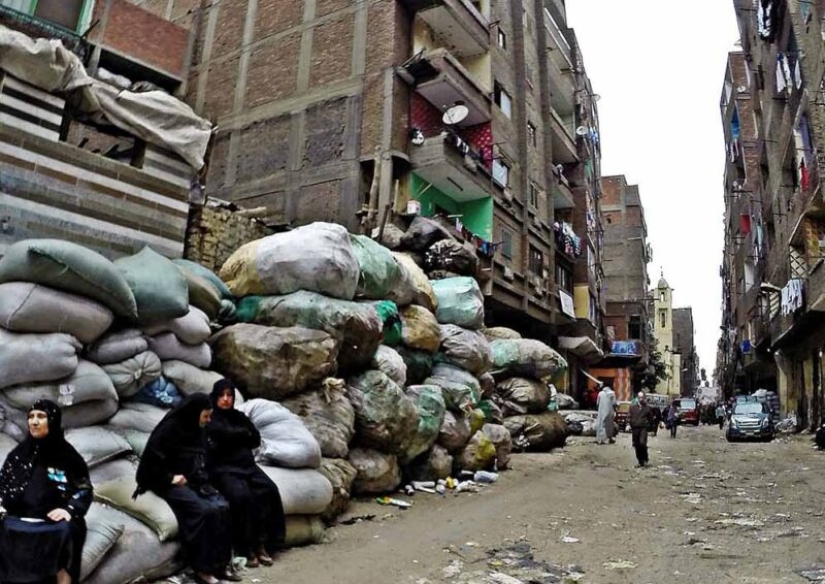
According to the scavengers, none of them has become a millionaire yet, but no one has died of hunger either. In a word, the dump gives these people a stable job, which will always be. Even now, when due to the coronavirus epidemic in Many restaurants, cafes and shops have closed in Cairo, and unemployment has increased significantly, the "zabbalins" do not feel the crisis, because people still produce waste without stopping, which eventually end up in the Manshiyat Nasir quarter.
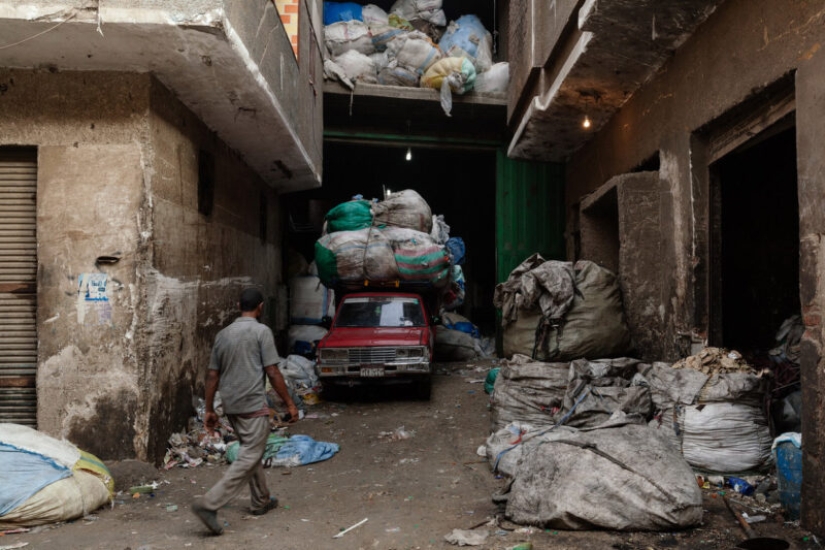
The brought garbage is carefully sorted, separating food waste that goes to feed pets from non-food waste. Glass, rubber, paper, metals and electronic components are selected and recycled. Everything that remains is burned or thrown right there, into Manshiyat-Nasir. The roads and sidewalks of the quarter are hidden under a thick layer of garbage compressed by feet, wheels and hooves, and in the air, in addition to the stench, there is a thick toxic dust.
Despite the fact that Manshiyat Nasir is a typical "stone jungle", there are many domestic animals living here. Cows, goats, sheep, pigs and poultry graze in whole herds and broods between the ugly houses of the quarter. The zabbalins build their homes in a special way-floor by floor, which can be either 2-3 or 10.
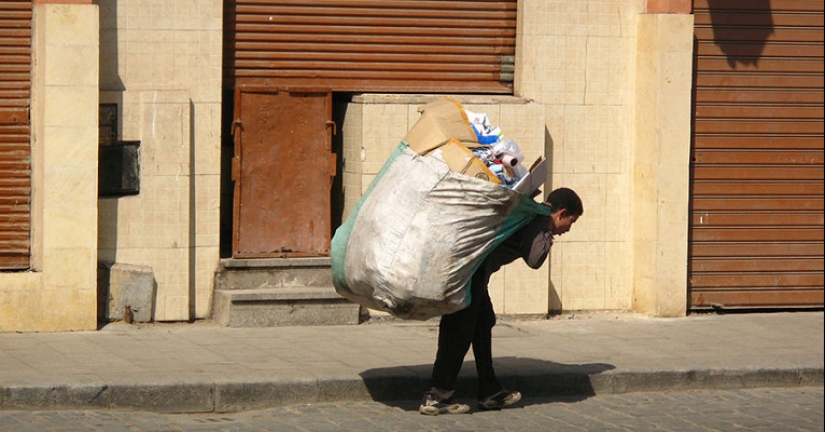
The lower floors are the working area where tons of waste are sorted. The owner himself lives above with his family, there are warehouses for useful things found in the garbage, and chicken coops, cowsheds and sheep pens are also equipped. In Manshiyat Nasir, no one is surprised by goats and sheep grazing on the 7-8 floor. Pigeons are especially popular here — locals eat them with great pleasure, and kebab shops offer to taste these birds stuffed with boiled rice.
Debris particles, soot and dust are all around the block. Dirt hangs in the air, settles on faces and lungs, covers buns and cakes sold in cafes. But this does not bother anyone — the "zabbalins" have been living in such conditions for generations and do not suffer from unsanitary conditions at all.
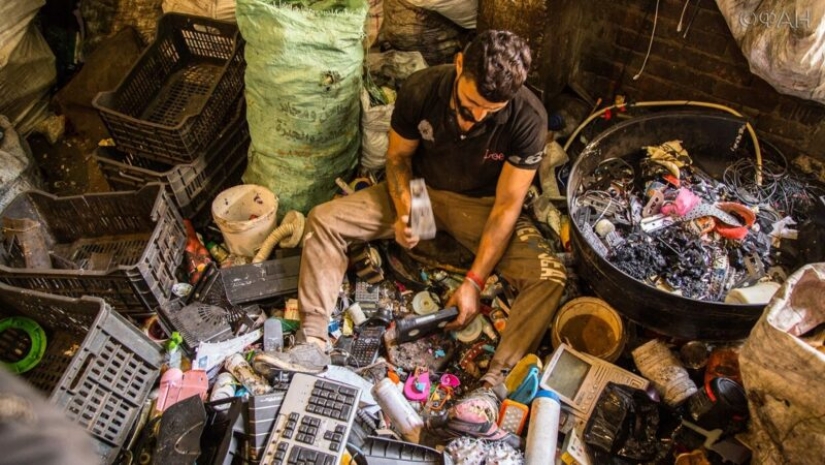
Local wits joke that even flies die from the stench and dirt in the quarter and, perhaps, this is not a joke at all. The fact is that despite the specifics of the area, flies are actually very rare here. And the sorters claim that their quarter never found out what COVID-19 is, because viruses simply die in terrible conditions.
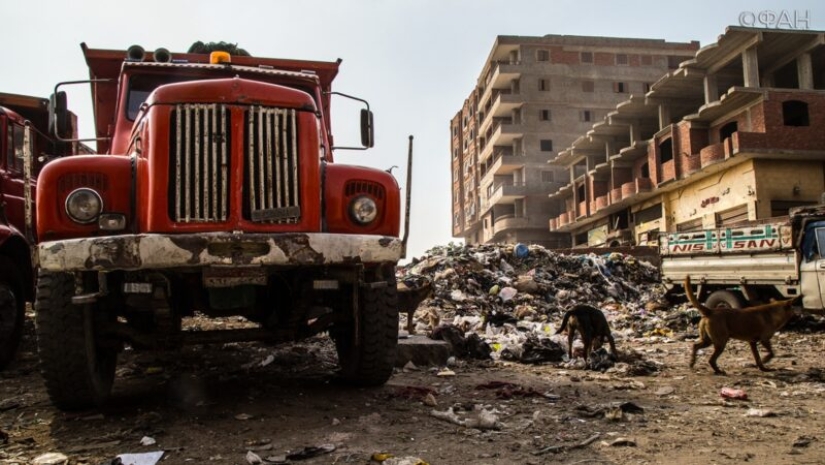
But why do the Cairo scavengers tolerate such monstrous conditions? The monthly income of a sorter from the Manshiyat-Nasir district is 6 thousand Egyptian pounds, or 30,000 rubles. If you consider that Egypt is a very poor country, then this is a very good income. In addition to the funds received for garbage collection and recycling, residents of the quarter can receive "bonuses"from their work.
We are talking about valuable things that end up in the trash by accident or on purpose. In the waste there are bundles of money, branded items with labels, expensive watches and jewelry. One of the scavengers, named Ibrahim, explained to journalists the origin of such finds simply:
The life of the "zabbalins" is not well covered by the press — these people do not like to be photographed and are reluctant to talk about their everyday life. At the sight of a tourist or a representative of the press with a camera, they can even show aggression — most of the sorters do not like that they are filmed as some kind of animals or colorful savages.
The city administration has repeatedly tried to restore order in the quarter — to clean the streets and alleys, replace communications, introduce registration of entrepreneurs and taxes, set a tariff for waste removal. There is also a project to equip the quarter with special waste incinerators.
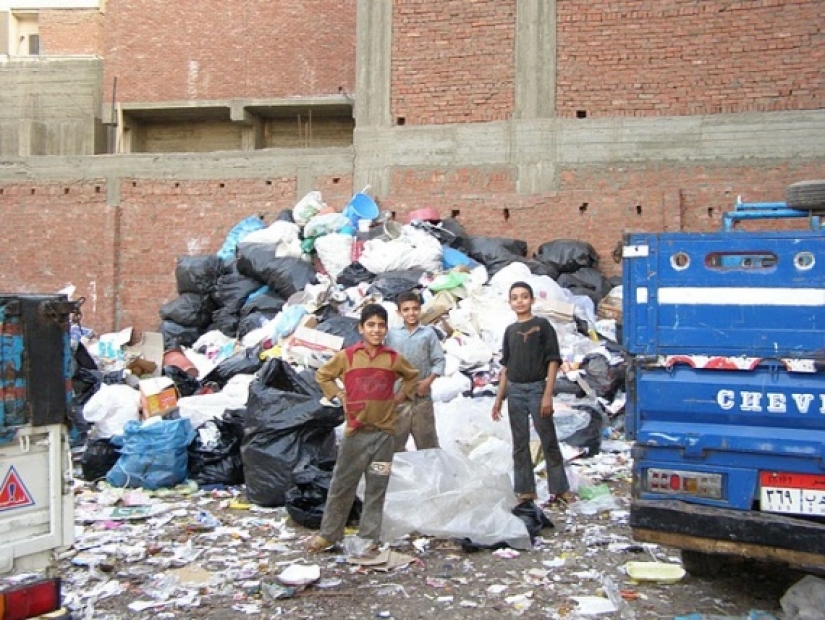
But all the innovations of the authorities meet the active resistance of sorters. The "empire of scavengers", in case of stricter rules and interference in their lives, threatens to strike a "retaliatory blow". To do this, you do not even need to do anything, or rather, you only need to do what to rest. If the "zabbalins" stop performing their not very honorable, but very necessary work, the huge Cairo will simply drown in its own waste.
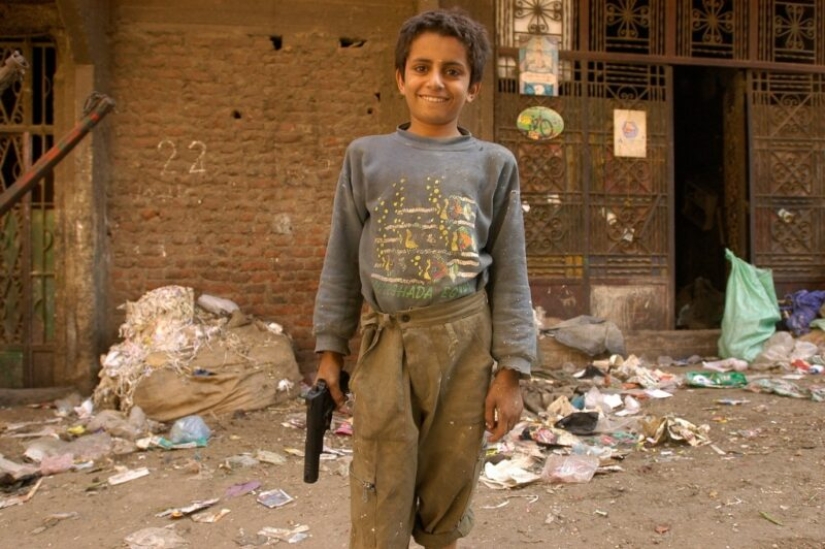
Some people claim that the criminal clans of Cairo used to use the services of "zabbalins". Corpses were brought to the quarter, which were supposed to disappear without a trace. The bodies were hidden in landfills and no one else saw them. No one can say exactly how many dead people are hidden among the piles of garbage. But if you ask the scavengers themselves about this, they will certainly laugh it off — no one wants their home to be treated as a criminal cemetery, even if this house is a garbage dump.
The garbage mafia dictating its terms to the city authorities is not the specifics of Cairo. Mafia clans have long chosen this business in the United States and for decades skillfully manipulated officials of various levels, threatening to stop the export of waste.
Keywords: Egypt | Empire | Cairo | Mafia | Garbage | Scavengers
Post News ArticleRecent articles

It's high time to admit that this whole hipster idea has gone too far. The concept has become so popular that even restaurants have ...

There is a perception that people only use 10% of their brain potential. But the heroes of our review, apparently, found a way to ...
Related articles

In November 69 BC, she was born Cleopatra, the last Queen of Egypt from the Macedonian dynasty of the Ptolemies. Cleopatra, perhaps ...

The inhabitants of ancient Egypt treated many animals with great respect, but cats have always been especially important to them. ...

In different countries, kissing is treated differently. Somewhere no one will pay attention to the kissing couple, and somewhere ...

New Year's is a time to surprise and delight loved ones not only with gifts but also with a unique presentation of the holiday ...